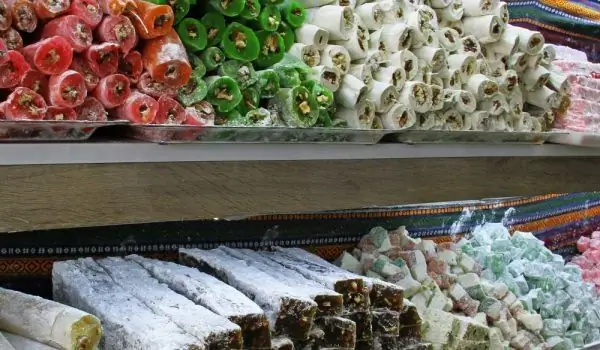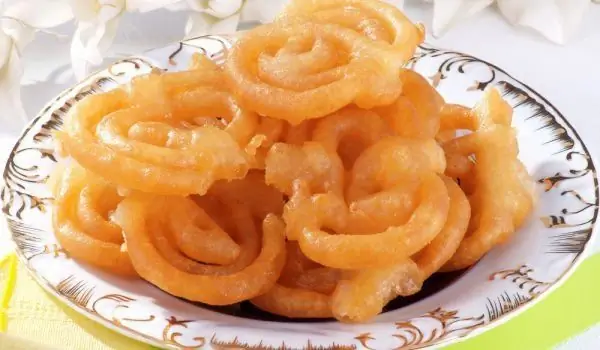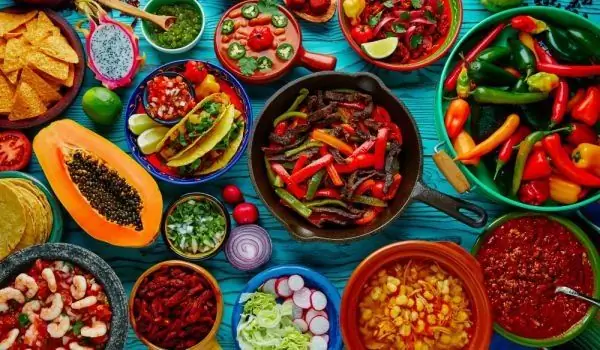2025 Author: Jasmine Walkman | [email protected]. Last modified: 2025-01-23 10:18
Having already taken you on a culinary journey to Ethiopia and Estonia, I will now take you to Iraq. This country does not have a very good reputation and is not often a preferred tourist destination, but it is the cradle of ancient peoples and great civilizations - Sumerians, Assyrians and Babylonians, hidden between the rich and fertile lands along the Tigris and Euphrates rivers.
I guess in the minds of many of you, Baghdad is associated with the beautiful tales of your childhood, where caliphs and wizards walk the streets of Baghdad like fairytale characters from The Thousand and One Nights. The culinary world of Iraq is rich in spices, spices such as coriander, allspice, saffron, cardamom, bread, ginger. In their kitchen you can also find olive oil, almond oil, pine nuts, macaw seeds, sesame seeds, cinnamon sticks.
The aroma of freshly brewed coffee in a copper pot, served in beautifully painted cups, is unique. Interestingly, before brewing the coffee, the beans are heated and cooled nine times so that they can be cleaned of all unnecessary impurities that can spoil the taste of coffee. Its taste, like that of tea, is very different from that which is familiar to us, because the people there put in the coffee and tea beans of a spice called hel. As I guess you know, the locals prefer to eat lamb, which they roast on wood and which is very similar to our St. George's lamb.
Very often on the table of the locals you can find fish, which is pounded on wooden sticks and smoked on embers. Some connoisseurs of Iraqi cuisine say that India has some influence on local cuisine because curry and Indian rice are often used in Iraq. If you go to Iraq, you should definitely try the Arabic baklava, which is famous for its unusual aromas and taste. The preferred drinks in Iraq are pomegranate and orange juices. Today, the cuisine of Iraq, in addition to traces of Indian cuisine, you can find traces of Iran, Turkey and Syria.

Like the Turks, Iraqis eat a lot of vegetables, rice and yogurt. The only similarity between Iranian and Iraqi cuisine is that both countries prepare beef and poultry with fruit. Although in Iraq the way of cooking does not differ much from that of neighboring countries, there are a few dishes that are specific only to Iraqi cuisine. Masgouf is a specially prepared fish that is grilled.
A characteristic feature of Iraqi cooks is that they cook almost all parts of the animal, including the legs, brain, eyes and ears. There they prepare foot patch, sheep's head, stomach and broth, which are cooked very slowly for hours. Wheat, barley and rice are present in almost every meal in Iraq. As I mentioned, the locals love lamb, but they also eat beef, chicken, fish, and not infrequently camel meat. They usually cut the meat into strips and cook it with onions and garlic. Often the hosts grind it into minced stew and serve it with rice.
For the majority of the local population (95% are Muslims), cooking and eating pork is prohibited. Alcohol is also banned, so western drinks, water, coffee and tea are the most commonly consumed drinks there. Locals drink coffee and tea with sugar, cream or milk, depending on the tastes of each person.
During Ramadan Bayram, all locals eat before dawn. The food they eat is called suhur and includes various cereals as well as bananas. Everything you eat should be eaten and digested slowly. This helps them with hunger during fasting, which can reach up to 16 hours a day. After sunset, Iraqis begin eating a dish called iftar, followed by appetizers, bread, lentil soup and fresh fruit.

Typical eating in Iraq starts with a small appetizer like kebab. The soup is served afterwards, but it is not eaten with a spoon, but is sipped directly from the bowl. The main one is most often lamb with rice. Other popular dishes you can find on the Iraqi table are quzi, which is roasted stuffed lamb, and kibbeh, which is minced meat with nuts, raisins and spices. For dessert they can offer you a fruit salad with jelly fruit.
Most locals keep pastries and desserts for breakfast or serve them as a gift to the host when they go naked. Pumpkin pudding and baklava are among the favorite desserts of Iraqis, although quite often at the end of each meal they eat raw fruits. Candied lemons, grapefruits and oranges are also revered by locals.
Recommended:
Mexican Cuisine: Plenty Of Products And Flavors

Provincial cuisine in Mexico has been using techniques and tools since the conquest of the country in 1521, although few grind corn and spices with volcanic stones because the food processor is faster. But beans, for example, are cooked every day in beautiful colored clay pots.
Greek Cuisine - A Wealth Of Recipes And Flavors

When you hear Greek cuisine What is the first thing you think of? I remember three things - Greek salad, olive oil and olives. However, this is not all that Greek cuisine has to offer. It is rich in many flavors. In it we can find both recipes for delicious Mediterranean food and a wide variety of Balkan food included in its recipes.
Flavors And Specialties Of Algerian Cuisine

Algerian cuisine combines typical elements of Middle Eastern and Mediterranean cuisine, which makes the country's cuisine quite different from the usual for the North African region. The cuisine of Algeria comes from various ancient cultures, which in the past often visited or traded with the country.
Aromas And Typical Dishes Of Ethiopian Cuisine

Interesting about Ethiopian cuisine is that it is extremely influenced by the religious affiliation of Ethiopians, who are Coptic Orthodox Christians and observe all fasts: Christmas, Easter, include some shorter and necessarily fast on Wednesdays and Fridays throughout the year.
Aromas And Typical Dishes Of North Indian Cuisine

We are used to thinking of India as a flat, hot and dry land. But northern India is cold and buried under the eternal snow of the Himalayas. South of Kashmir, in the plains of the Indus east of the Ganges to the west, grows the famous basmati rice.

